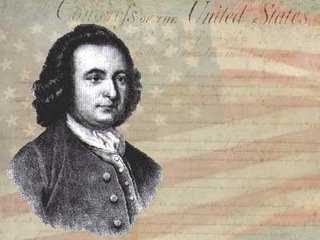I didn’t go to the undergraduate school, but rather the UCLA School of Law. And so it was that rather than paying attention to the basketball tourney, I was fascinated by the hearing in the Senate Judiciary Committee on Russ Feingold’s Censure Resolution.
That doesn’t mean I wasn’t thinking about George Mason. After all, George Mason has been dubbed, “the father of the Bill of Rights,” and Thomas Jefferson called him “the wisest man of his generation.”
Jefferson gave George Mason the most sincere form of flattery: he imitated his fellow Virginian’s language when he wrote the Declaration of Independence. Mason had authored the Declaration of Rights, which the Virginia Assembly approved on June 12, 1776.
“All men are born equally free and independent,” the Virginia Declaration began, “and have certain inherent rights.” Among those rights are “the enjoyment of life and liberty, with the means of acquiring and possessing property, and pursuing and obtaining happiness and safety.”
The Declaration went on to assert that the power of government is “derived from the people,” who retain “an indubitable, inalienable, and indefeasible right” to “reform, alter, or abolish” governments that fail to serve their interest. It also went on to assert freedom of religion and the press, as well as a right to due process of law and trial by jury.
I have argued that the President’s program of domestic surveillance without judicial approve is an egregious violation of the Fourth Amendment to the Constitution, which forbids unreasonable searches and seizures. I leave it to you to decide whether it also violated Section 10 of George Mason’s Declaration of Rights:
That general warrants, whereby an officer or messenger may be commanded to search suspected places without evidence of a fact committed, or to seize any person or persons not named, or whose offense is not particularly described and supported by evidence, are grievous and oppressive and ought not to be granted.It is impossible to know what George Mason, or for that matter the Founders, would think of electronic surveillance. Of course, that is not the same as saying that there is no body of law and jurisprudence to which we can turn to decide questions in this area. For the reasons I have suggested elsewhere, the answers are not too difficult to discern.

Today’s hearing in the Senate Judiciary Committee was about whether or not the President could thumb his nose at the FISA law. On that point, we do not have to wonder what George Mason would have thought. He was, after all, the author of these words from the Virginia Bill of Rights:
That all power of suspending laws, or the execution of laws, by any authority, without consent of the representatives of the people, is injurious to their rights and ought not to be exercised.Can there be any reasonable doubt about what George Mason would have said about King George W’s conduct?
Go George Mason!
“… and tell ’em Big Mitch sent ya!”














